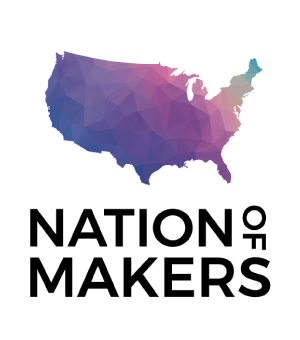Making the Case: WORKFORCE DEVELOPMENT
In the US today there is an indisputable skills gap across industries. A U.S. Chamber of Commerce Foundation study interviewed 500 hiring managers in November 2019 finding 74% agree there is a skills gap in the current labor market. Indeed, 48% of these managers say that candidates lack the skills needed to fill open jobs.
Employers, including the US Federal Government, increasingly value worker skills over degrees. This is especially true for digital jobs that currently go unfilled due to a lack of qualified candidates. As college graduates with high levels of student loan debt struggle to find living-wage jobs, educators must abandon past assumptions that college is the only route for every person. It is time to invest in more agile and inexpensive maker learning paths that lead to engaging, well-paying, 21st-century careers.
Makerspaces, community colleges, and industry and trade associations offer a range of opportunities for skills acquisition desired by industry. However, there is currently no universally-accepted credential system to validate and certify workers for their competencies. There is also a lack of exposure to these new vocational pathways in U.S. high schools. To build a robust U.S. workforce, we must invest in a broader landscape of more flexible learning environments that offer accessible and universally recognized formats for skills acquisition.
POLICY OPPORTUNITIES
Policymakers can implement an integrated, strategic, maker approach to resolving the disconnect between education/workforce training and job market needs by:
Integrating and building upon micro-certifications and certificates such that they can be equitably accessed across the country through a range of channels, including community and high school makerspaces.
Working with employers across industries to update hiring practices in order to recognize and accept competency-based micro-credentials over degrees where appropriate.
Integrating related micro-credentialing and certifications into apprenticeship programs.
Case Studies
The Makerspace Training, Collaboration, and Hiring (MaTCH) Pilot Competition
The Small Business Administration’s Makerspace Training, Collaboration and Hiring (MaTCH) Pilot Competition aimed to address the job skills and placement gaps faced by local small businesses by helping fund the creation or expansion of makerspace programs that provide job-specific and soft skills training, including industry or trade certifications.
Humanmade’s Next Generation Manufacturing Training Programs
Humanmade’s Next Generation Manufacturing Training Program™ takes a holistic approach in ensuring participant’s success. In addition to over 250 hours of project-based learning, NGMT program participants work with Humanmade’s Client Support and Outreach Coordinator to hone their job readiness skills which includes resume writing, portfolio building, workplace etiquette, and financial literacy. To ensure their success in the industry, our Client Support and Outreach Coordinator continues to work with NGMT program graduates for at least 1-year after the completion of the program.
U.S. Department of Labor Adopts Micro Certifications as Part of the New Additive Manufacturing Technician Apprenticeship
Fab Lab Hub in Santa Fe, NM worked with sponsor Youngstown State University to integrate IBM IT badges and New Collar Network digital design and 3D Printing badges into their new US Department of Labor-registered apprenticeship for additive manufacturing technicians. It’s a natural fit, and a good way for micro-credentials to enter the mainstream.
Next Gen Makers: California Community Colleges Prep Students with Makerspaces
The CCC Maker Initiative supported California Community Colleges are to build makerspaces, help faculty embed making into curriculum, prepare students for STEM/STEAM careers, and cooperate with regional employers to provide internships. This statewide program was funded by the California Community College Chancellor’s Office, Workforce and Economic Division
“Each community college has designed a plan that is unique to its campus and community,” says Carol Pepper-Kittredge, CCC Maker Statewide Project Director. “It’s not a cookie-cutter approach. It’s very much looking at what are the needs of the students and faculty and employers in that region, and asking, ‘How can a makerspace add value, not only internally to curriculum, but also produce students that are more aligned with the high-wage, high-skilled jobs available in their communities?’”




